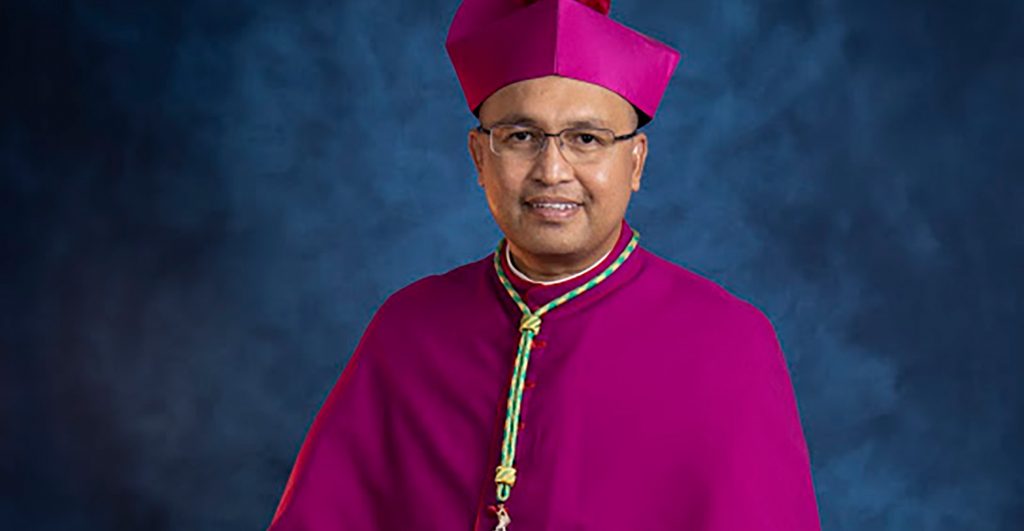‘Spiritual wellness helps us think beyond ourselves’
The pandemic has truly caused extraordinary disruption and anxiety throughout the world, which is why going back to what gives us hope, inspiration, and the will to go on is important more than ever. And the more we watch out for the wellbeing of others, the better all of us will be, according to Diocese of Chalan Kanoa Bishop Ryan Jimenez.
“…The specific challenges of the economy and the threat of disease that challenges all humanity makes us more aware of our common challenges and the more we have solidarity with all who suffer equally, the more we watch out for the wellbeing of others, and the better all of us will be. This is ‘common sense’ spirituality and propels all of us to think beyond ourselves, our families, and our customary communities because the pain of humanity makes us more united,” he said.
“Many who are practicing their religion in a conventional or nominal way can find real support in the heart of the spiritual mission of all religions because it is not about building churches and institutions now, it is about the reality of human suffering and solidarity which religion addresses with a heritage of faith, service, and a credible story of God who loves and teaches us that such love is our mission also,” he added.
According to Jimenez, taking baby steps to raise one’s spirituality makes a difference when disheartened and beaten by life challenges. “Oftentimes, people who are disheartened feel needy, are broken, and suffer from several failures in their communities. Often they live in a psychological world full of ‘poor me.’ This world can become a deep downward spiral if they turn to substances, or thought processes, or addictive behaviors as a relief, or as pain-killer, or as some kind of social identity which can be criticized as shameful,” he said.
“The way through some of this is to not focus on the self and problems, but to be giving and loving as one is able. Small steps in becoming loving are important and can contribute to immense psychological healing and a little can go a long way,” he added.
For counselling and comfort, Jimenez said that most professional-level workers in churches (clergy, elders, overseers) have some training in pastoral counseling for activating religious solutions to many human problems. “Moreover, they want to motivate the members to provide ordinary and compassionate love to the persons who are suffering in their midst. The stories of human suffering deserve attention and respect by all religious people, and the act of compassionate listening contains much power to heal and encourage,” he said.
“Those who are Christians are called to be ready to listen, to love, and to support the broken persons in their lives and to regard such suffering persons as gifts from God, like true brothers and sisters,” he added.
Jimenez said that building a strong spirituality requires strong relationships with other people and not just with God or the saints. “The more one can relate within the usual communities of life and break the boundaries toward loving the needy, the more complete the challenge of wellness becomes. Everyone can do this, even the most miserable of us. It does not mean we become social workers or join clubs or raise money (but it may include this for some). It just means we become more fully human ourselves by engaging and loving other people whom God himself puts into our lives and who need the love only we can give.”
“This is not patronizing love, but a kind of special commitment to loving the unloved, serving the ungrateful, accommodating the strange, and being consistently positive with the angry, prejudiced, and hateful. We are designed by God for this, and Christians tell the story of God’s son who made this characteristic obvious to his followers,” he added.
To find encouragement and purpose in life, you have to listen to yourself, Jimenez said. “If you know the right thing to do, do it. Sometimes it is awkward to seek forgiveness, to offer forgiveness, to give of self, to be loving. We don’t have to push, but we can do the right thing, which is always a loving thing. Doing the right things reshapes our lives, our time, our energies, our resources, and our relationships as it brings us closer to God and allows us to work with him in His mission,” he said.
“…The most important challenges in life are not just temporary. They are always the same issues…pride, prejudices, malice, shame, and all the things associated with the ‘seven deadly sins.’ The forms differ a lot but the fundamental challenges to reform our lives with the help of God and our communities—this is the stuff of life. When we work out our guilt in some of these matters, the temporary challenges of life become far more manageable,” he added.
During this pandemic, Jimenzez said that love renders us healthy and love gives us the foundation and stability that sustains. “Love is the endowment of every human being (we can do it), and any church serves to strengthen its members to undertake the great effort of love,” he said. “…That is our job, really—to minimize the damage and…to replace some of it with authentic humanity. I believe firmly that God does this in every human being, and that churches are supposed to assist with God’s mission.”
























